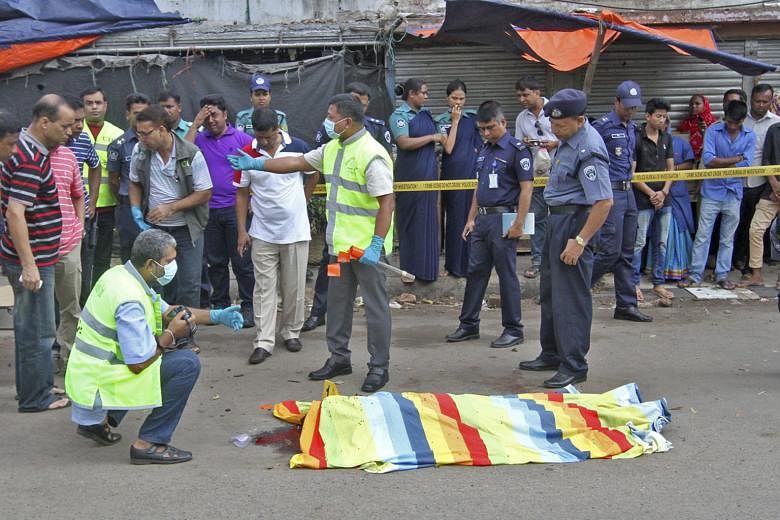DHAKA • While the government was taking pride in containing militancy by cracking down on fundamentalist group Jama'atul Mujahideen Bangladesh (JMB) over the last few years, two new radical militant groups have built up an extensive network that remained relatively unnoticed until late last year.
One group leans towards Al-Qaeda while the other is influenced by Islamic State in Iraq and Syria (ISIS). Ansar Al-Islam, previously called Ansarullah Bangla Team, began gaining strength in 2013 to 2014, especially in the northern regions.
It wanted to launch Al-Qaeda in Bangladesh, like Al-Qaeda in the Indian Sub-continent, known as AQIS. But AQIS headquarters in Pakistan did not approve of the idea and suggested Ansarullah be renamed Ansar Al-Islam and work as the Bangladesh branch of AQIS.
Syed M. Ziaul Haq, who made headlines after trying to engineer a military coup in 2012, is its military commander.
Police say around 200 trained members are active in the country to execute his plans, according to the statements of some of its arrested members. It recruits from Islamic fundamentalist groups like JMB, Jamiat Ahle Hadith, Hefazat-e-Islam, madrasahs and financially vulnerable families.
The other group, which aligns with ISIS, is led by a Bangladeshi-Canadian named Tamim Chowdhury, also known as Shaykh Abu Ibrahim Al-Hanif, according to the ISIS propaganda magazine Dabiq. It recruits physicians, engineers, technologists, architects and educated people. Its members are comparatively affluent.
In the latest issue of Dabiq, Tamim claimed that a section of Shibir, the student wing of Islamist political party Jamaat-e-Islami, is also working for his group in Bangladesh. Its arrested members include the sons of a former Supreme Court judge, a former military official and a former bureaucrat and an adviser to a former caretaker government.
According to statements of the arrested members of this group, some of its militants are Syrian war returnees. It has about 100 militants, including women, now fighting in Syria. Some others have died.
The ISIS-influenced group has two main wings - a southern wing based in Mirpur and a northern wing in Gazipur. Its operational headquarters are in Savar and Tongi while its training centre is in Mirpur. Detectives are trying to pinpoint these locations.
-
The two groups
-
ANSAR AL-ISLAM
•Aligns itself with Al-Qaeda
•Previously called Ansarullah Bangla Team
•Led by Major (dismissed) Syed M. Ziaul Haq, who tried to engineer a military coup in 2012
•Gained strength from 2013 to 2014, especially in the northern regions
•Recruits from madrasahs, poor families, and other fundamentalist groups such as Jama'atul Mujahideen Bangladesh
•Has around 200 trained and active members in the country
•Targets secularist writers or bloggers and gay rights activists
ISIS-INFLUENCED GROUP
•Aligns itself with the Islamic State in Iraq and Syria (ISIS)
•Led by Bangladeshi- Canadian Tamim Chowdhury (Shaykh Abu Ibrahim Al-Hanif)
•Has two main wings based in Mirpur and Gazipur
•Recruits physicians, engineers, technologists, architects and educated people. Its members are comparatively affluent
•Arrested members include an adviser to a former caretaker government, a son of a former Supreme Court judge, a son of a former military official and a former bureaucrat's son
•Some militants are Syrian war returnees
•Has about 100 militants, including women, fighting in Syria
•Targets religious leaders, academics and foreigners
In the last 18 months, militants have killed at least 47 people. On Sunday, suspected extremists killed Mahmuda Khanam Mitu, the wife of top anti-terror police official Babul Akter, as well as a Christian grocer.
These two militant groups have claimed responsibility for 28 of these killings.
It appears that Ansar Al-Islam mostly targets secularist writers or bloggers and gay rights activists. They pick victims who can be labelled as anti-Islam, and as such, the deaths would not gain sympathy from common folk.
Targets of the ISIS-aligned group include a wide spectrum of people - Hindu, Christian, Buddhist or Baha'i leaders, spiritual leaders or pirs, members of the Shia Islam sect, university teachers, religious converts, and foreigners, among others.
Police claim to have arrested about 150 members of the two organisations and recorded statements from about 50. Seven have been killed in "crossfire".
These militants are mostly new and not necessarily JMB-bred, according to well-placed police sources. They have developed their own messaging software so that police cannot intercept their communications through mobile phones or the Internet.
This new breed of terrorists is efficient and highly educated and maintains close contact with international terrorist organisations.
"Preoccupied with curbing the JMB activities, we failed to notice that the local pro-ISIS group was developing an extensive network. We had a glimpse of its full network last November," said a top official.
"Detectives have brought JMB under control. The ISIS-influenced group will also come under control. But it will take time," he added.
"They are more organised than any other militant groups - dedicated, smart and suicidal. Before they embark on any operation, they have their last prayer and bid final farewell to their comrades. They assume that they would certainly die if they get arrested."
Detectives claim to have foiled a number of big plans of these two groups. One involved the planned attack on an embassy of a Western country; detectives recovered huge caches of arms and ammunition capable of blowing up a big multi-storey building.They had even planned to attack and occupy a private television channel to televise their messages - just to draw the attention of the world.
Officials insist ISIS does not have a presence in Bangladesh, but the threat of these new militants is real.
Counter-Terrorism and Transnational Crime unit chief Monirul Islam said: "As the situation of militant organisations based in Iraq, Syria and Afghanistan has become fragile due to the global situation, they are now more interested in the sub-continent."
Those who favour radical Islamic ideology are getting involved with these militant groups, he said.
"ISIS and Al-Qaeda are releasing videos online. These are inspiring some people to join these militant groups."
THE DAILY STAR/ASIA NEWS NETWORK

